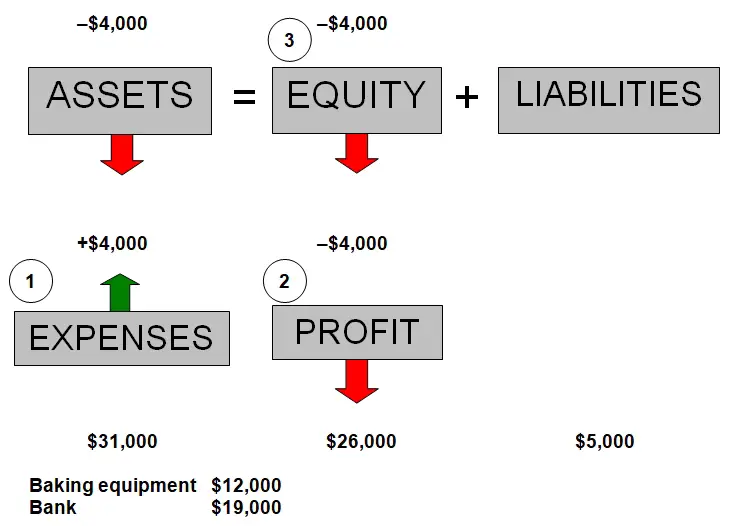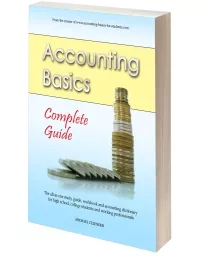Expense Journal Entry
Previous lesson: Journal Entry: Cash Received From a Debtor / Accounts Receivable
Next lesson: Accounts Payable Journal Entries
In this lesson we're going to cover the previous expenses example for our sample business, George's Catering, and we'll learn the full debit and credit cash expense journal entry.
Be sure to check your understanding of this journal entry and lesson by taking the quiz in the Test Yourself! section further below. And right at the bottom of the page, you can find more questions on the topic submitted by fellow students.
Expense Journal Entry Example (Salary)
h) In order to be able to successfully pull off the catering job for the wedding and for future jobs, George decides to hire an assistant. He paid the assistant a $4,000 salary. What happens with this?
As usual, we're going to first take a look at which accounts are affected here and what the impact of this transaction is on the basic accounting equation. Once that's done we'll work out the double entry.
Here's how our accounting equation is impacted by this transaction:
The easiest account to figure out here is bank or cash.
$4,000 salary is paid, and this means that our bank account will decrease by $4,000.
As an asset of ours, bank increases on the debit side of our accounting equation (left), and decreases on the credit side (right). So in this case we will credit the bank account of the business.
The next question to ask is which account we debit.
Another way of asking this is, "What are we paying the cash for?"
The answer to this, of course, is salaries.
The salary paid to the assistant is an expense, and this amounts to $4,000.
Expenses take place (or increase) on the debit side of our accounting equation (left), because it is the opposite of income and means less profit (2) and less owner’s equity (3) (i.e. less share for the owner).
So, we debit the account salaries, which is an expense.
The expense journal entry here is:

Just like with income, when we have an expense, we use the specific name of the expense, which in this case is salaries.
This salaries expense will result in $4,000 less profit and $4,000 less for the owner.
Important note: Remember that an expense is not the same as the cash payment.
A cash payment is the loss or reduction of the cash asset.
An expense, on the other hand, is simply the event that results either immediately or at a later stage in a reduction of assets.
This will become even more clear in our next tutorial, where we'll cover an expense that we do not pay immediately.
Test Yourself!
Before you start, I would recommend to time yourself to make sure that you not only get the questions right but are completing them at the right speed.
Difficulty Rating:
Beginner
Quiz length:
3 questions
Time limit:
4 minutes
Important: The solution sheet on the following page only shows the solutions and not whether you got each of the questions right or wrong. So before you start, get yourself a piece of paper and a pen to write down your answers. Once you're done with the quiz and writing down your answers, click the Check Your Answers button at the bottom and you'll be taken to our page of solutions.
Good luck!
If you're still having difficulty understanding expenses, go back to our earlier lesson entitled Define Expenses, where you can learn more about this concept and how it works.
Or, if you're struggling with doing double entries, return to our earlier lesson called Debits and Credits: What They Really Mean.
Otherwise, feel free to move forward to our next lesson, where we'll cover accounts payable journal entries.
Return from Expense Journal Entry to Double Entry Accounting
Return to the Home Page
Stay up to date with ABfS!
Follow us on Facebook:
Previous lesson: Journal Entry: Cash Received From a Debtor / Accounts Receivable
Next lesson: Accounts Payable Journal Entries
Questions Relating to This Lesson
Click below to see questions and exercises on this same topic from other visitors to this page... (if there is no published solution to the question/exercise, then try and solve it yourself)
Rent Expense Journal Entry Example
Q: Prepare the journal entry for the following transaction:
Paid rent $200.
A: The rent expense journal entry is not too complicated:
DR: …
© Copyright 2009-2023 Michael Celender. All Rights Reserved.
Click here for Privacy Policy.








Comments
Have your say about what you just read! Leave me a comment in the box below.